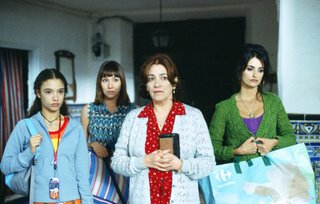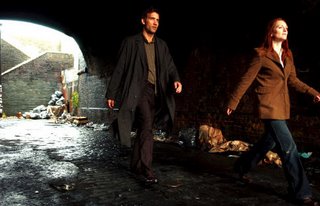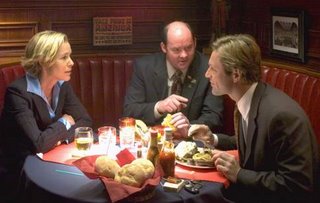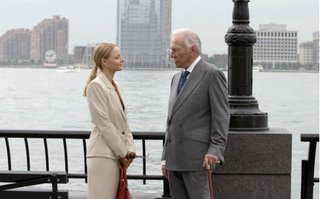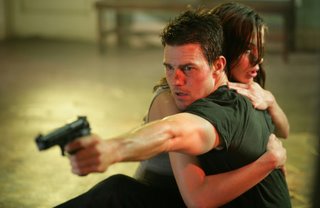The International Film Festival of Athens began on 20th of September. As a serious movie-goer I made an effort to see as many films as I can. Usually I try to see films that rare, old or from directors that i don’t know. My goal is to use every festival as an opportunity to see and get to know new things. Sometimes though circumstances force me to see films that i wouldn’t prefer seeing in a festival. My time schedule is tight or there no tickets left for the show i chose at first place so i see something else instead and so on.
So until now from the numerous films I' ve manage to see the following four: The Treatmnet- Oren Rudavsky, Paprika-Sotashi Kon, Lights in The Dark-Aki Kaurismaki, The Brick-Rian Jonson
The Treatment
A middle-aged man, a literature teacher is facing problems with his sexual relationships. He isn’t able to let go his past girlfriends and connect emotionally and sexually without remorse with a woman. In order to deal with this problem he visits a therapist who insists that all his problems derive from his relationship with his mother. A recently windowed woman expresses her interest in and he collapses. He doest know how to treat her and he is afraid that he is going to get hurt from thei relationship. Suddenly he realizes that therapy isnt helping all that much.
A modest film that is heavily based on the good acting of both its leading actors (Chris Eigement and Framke Jansen) and its clever dialogues. The humor on erotic relationships is insightful and bittersweet. In most jokes the audience laughed knowingly since it could completely identify with the situation and the characters.
Simple and modest this film wins you over by stating two-well known facts that sometimes we all forget: people have too many inhibitions and are stuck in their past. These mistakes can cost you your happiness.
Paprika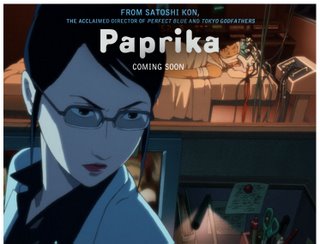
Paprika is an animated film with adult characters and an adult scenario. Scientists have invented a machine that allows the psychiatrists to enter the patient's dreams in order to help him find out what is troubling him. The machine, though, is still experimental and it is forbidden to use it. A girl named Paprika uses the machine in secret in order to help people by accessing their dreams. The machine though is stolen and misused. The one who stole it creates dangerous hallucinations and drives people crazy. He tries through people's dreams to control them. Paprika with the help of the scientific staff and a detective manages to put a stop to this dangerous terrorist.
The animation is done quite traditionally. No 3d effe, not very extended usage of the computer possibilities. As a result the comic has a nostalgic, more traditional Japanese feeling in it. It remains aesthetically perfect, full of original design, colour and fantasy.
The script is completely adult. It has so many twists and turns and everything happens so fast that it is difficult to follow. to tell the truth the scrip isn’t so original. The idea of entering someone’s' dreams with dangerous results has been exploited in the past (The Cell comes immediately to mind). I appreciated the fact that the sexy lady ends up with the ugly fat guy instead with the action male figure. Such deviations from the usual route entertain me.
In this film thought the animation and the images are more important. The images manage to remain in your head for some time after the movie and that means a lot.
Lights in the Dark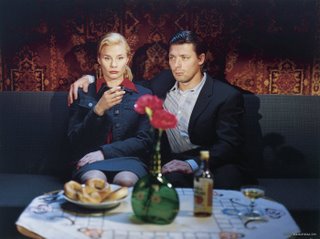
Several years ago Kaourismaki gained a spot in my heart with his film A man without past. From there and on accepting anything less from him has proven difficult. Unfortunately his latest film Lights in the Dark doesn’t measure up, even if it remains a good film.
A night guard falls in love with a beautiful girl. She however, uses him in order to learn the security codes and steal a jewellery shop. He is accused for the theft and sentenced to prison.
Kaourismaki describes Helsinki as a place of poverty and despair. All human touch and dignity has been lost. Can Finland really be so bad? The hero, a good but socially awkward man is hit and destroyed. When he seems in the ropes end though he manages to still pick up himself and continue. Everything good he has done is coming back to help his stand on his feet and resume his life. Kaourismaki for once more he declares that even when everything seems black people can make it.
The script is not original. It has no twist and surprises. A common story in film noir (boy meets fatal girl, he falls in love and he is destroyed by his love) is used here with a different angle. Destruction itself is not important. What counts is the fact that this man at the downhill of his life still struggles and goes on. Through simple means and scarce dialogues Kaourismaki manages to create atmospheric pictures and convey sufficiently the mood of a hard society that drives people to their edge. The humour though that emphasized the hidden but strong optimism of A man without Past is not at its best. To those who haven’t seen another Kaourismaki film my advice is to go and see this one and then search to find previous work on dvd. For the rest Lights in the Dark is still a more meaningful way to pass an evening than watching tv or a Hollywood film.
Brick
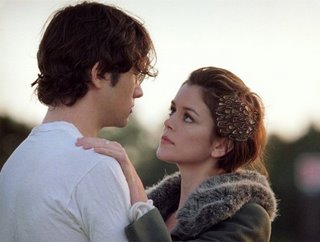 A noir film with all the right elements of the style filmed though at school with teenagers. A paradox that works all right.
A noir film with all the right elements of the style filmed though at school with teenagers. A paradox that works all right.
Emily-his ex girlfriend-calls Brian asking for his help. After two days he finds her murdered and tries to find out who killed her and why. A whole subterranean universe is revealed under the innocent environment of the local college. Crimes, drugs, sexual manipulation and so much more characterize a dangerous slippery environment where getting involved with the wrong kind of people might prove fatal. Parents are absent. They are just an obstacle to handle or completely oblivious to their children’s criminal activities. Teachers and the principle have taken the place of cups. They are not interested in truth. All they want is to look good and implant a resemblance of order.
Brian the hero is a young Humphrey Bogart. He has a weakness for pretty girls that they exploit. He is tough and clever. He is beaten heavily throughout the film and he endures and goes on until the end. The femme fatal is also here. A beautiful rich girl, a manipulator. She might not commit the act of murder herself but she manipulates the others to do it for her. She is a player. She seduces our hero and in the end she takes from him he is only comfort. The girl he loved, the girl for who he did everything didn’t love him back.
The script is really complex. It surprises in every turn as a James Elroy novel. The problem is that all this happens in a school! That all these corrupted people are teenagers! But is it really a problem? Rian Jonson was clever enough to use this element into his advantage. The film is a tribute to film noir without taking itself too seriously. A sense of humor and a light sarcasm penetrates most of the scenes. The drug dealers drink a glass of milk while waiting for the war between the gangs to begin. The mother of the big boss-drag dealer offers apple juice and cornflakes to the heavily beaten hero without asking him how he ended up all bruised up and so on.
Brick is a fun clever movie appreciated greatly mostly by funs of the film noir. See it as an inside joke, It is a film of an amateur. He loves what he is doing and that shows. On the other hand he still has a lot to learn in order to create a film like art. Go and see it, have fun but expect no more than that.
Trivia: The horn signal Brendan has Laura give him (long, short, long, short) is the same as the knock Sam Spade tells Brigid O'Shaughnessy that he'll give her as a signal it's him in The Maltese Falcon (1941).
Comment:
Oliver if you are out there reading this ….go to see this film it will remind our Essex days. This is what our film would be like if we had more time and money














